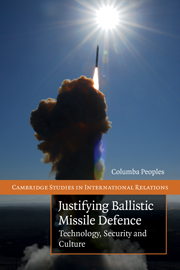Book contents
- Frontmatter
- Contents
- Acknowledgements
- List of abbreviations
- Introduction
- Part One Technology, security and culture
- 1 Critical theory, security and technology
- 2 Technology and common sense in America
- Part Two Post-war missile defence
- Part Three The Strategic Defense Initiative
- Part Four Contemporary missile defence
- Conclusion: common sense and the strategic use of ‘technology’
- Bibliography
- Index
- Cambridge Studies in International Relations
1 - Critical theory, security and technology
Published online by Cambridge University Press: 04 May 2010
- Frontmatter
- Contents
- Acknowledgements
- List of abbreviations
- Introduction
- Part One Technology, security and culture
- 1 Critical theory, security and technology
- 2 Technology and common sense in America
- Part Two Post-war missile defence
- Part Three The Strategic Defense Initiative
- Part Four Contemporary missile defence
- Conclusion: common sense and the strategic use of ‘technology’
- Bibliography
- Index
- Cambridge Studies in International Relations
Summary
The impact of technology on warfare has been a constant consideration of strategists running from Sun Tzu through to Clausewitz, increasing to such a degree by the twentieth century that the British strategist J. F. C Fuller declared that ‘Tools, or weapons, if only the right ones can be discovered, form 99% of victory.’ The advent of the ‘nuclear revolution’ only served to heighten the salience of this question of technology for the makers of modern nuclear strategy such as Bernard Brodie and Thomas Schelling, and the unprecedented destructive power of nuclear weapons spurred the emergence of the cognate discipline of security studies. In short, the question of technology's role and impact has traditionally been seen as central within both strategic thought and security studies.
The orientation of the argument made here is somewhat counterintuitive in this light. It begins from the premise that though strategic and security studies have devoted significant space to the consideration of (weapons) technology, they have actually been remarkably unreflective on the relationship between technology and security in spite of the amount of research devoted to this issue. This assertion is based on the fact that even accounts which place technology and technological change at their heart reduce the role these factors play to a series of familiar dichotomies: capabilities versus intentions; ‘push’ versus ‘pull’ factors in military technological development; manpower versus matériel; and, most fundamentally, whether technology determines the nature of international security or vice versa.
- Type
- Chapter
- Information
- Justifying Ballistic Missile DefenceTechnology, Security and Culture, pp. 11 - 45Publisher: Cambridge University PressPrint publication year: 2009



